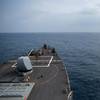The Y2K bug remained to be less than a threat last Tuesday as London rejoined the working world after the New Year break, but more traditional worries about interest rates quickly deflated markets.
From Bangkok to Reykjavik, bourses reported smooth trading without a millennium bug in sight.
In a rare exception to the rule, six companies listed on Turkey's Istanbul stock exchange reported Y2K-related problems. They were suspended from trading but all later said they had fixed the problem or were taking steps to correct it.
The West African state of Mali also reported that monitoring of its railway system had been disrupted by computer problems.
Despite an apparently smooth return to the financial fray, the UK's FTSE 100 index slipped sharply away from last year's record levels and by 1630 GMT was down 264.3 points, or 3.81 percent, at 6,665.9.
U.S. stocks also slumped in late morning in New York, with Internet, financials, retailers, gold and telecommunications shares leading the slide. The Dow Jones industrial average was down 174.67 points, or 1.54 percent, at 11,182.84.
Dealers said worries about possible near-term U.S. and British interest rate rises, which had already driven Wall Street down on Monday, were responsible for puncturing any millennium euphoria.
But the mood was leavened by hopes that a problem-free transition to 2000 could help Internet and technology issues.
"The fact there have not been any major Y2K problems will be good news. Some of the Internet stocks are going to be pretty strong," said Williams de Broe analyst Nigel Hawkins.
Technology and telecoms stocks have already led the way in many markets after the millennium bug failed to materialize in a significant way. The United States said it was already winding down its Y2K operations and that the bug had been "squashed."
But precisely the absence of Y2K problems contributed to a tumble in oil prices as wholesalers got rid of stocks they had bought in case of millennium disruption to supplies.
In the event, potential trouble spots like Russia, the Gulf, Africa and Latin America all said energy flows pumped through the date change without incident.
Japanese Stocks Hit Highs
Earlier, Japanese stocks had joined a widespread Y2K rally despite market suspicions that the millennium bug was history's most expensive -and tedious - piece of hype.
Tokyo marked the first working day of the New Year with its highest close in more than two years.
Japan's benchmark Nikkei average rose 0.36 percent to 19,002.86, ending above the closely watched 19,000 mark for the first time since August 21, 1997.
The rise followed a roller coaster opening day on the tech-driven Nasdaq in New York, which recorded its largest single-day point swing to end at a record high of 4,131.15.
"Tokyo shares followed the Nasdaq today. Also, trading was supported by those buyers who came back to the market now that Y2K-related concerns seem to have cleared," said Kunihiro Hatae, a general equities manager at Tokyo Securities.
Stock markets in Frankfurt, Paris, Milan, Madrid, Helsinki and Amsterdam all reached new peaks on Monday on the hope that investors would press on with last year's rally.
An Accident Waiting Not To Happen
Away from the markets, the almost total absence of Y2K glitches - predicted at one point to potentially end civilization as we know it - continued to raise eyebrows.
"With the millennium's first day playing out as the most over-hyped disaster since the release of 'Godzilla,' the world wound up focusing on what had gone right as 1999 became 2000," Daily Variety said in an article headlined "Yawn of a New Era".
The head of the global Y2K coordination drive said the full cost of upgrading computers for Year 2000 would never be known. Estimates of the worldwide bill have ranged from lows of $200 billion to three times as much or more.
Nevertheless, the Clinton administration declared it had "squashed" the bug and began winding down an unprecedented operation to monitor automated systems worldwide.
"We can safely say what has been referred to as the Y2K bug has been squashed with regard to the key infrastructure systems in the United States," President Bill Clinton's point man on the issue, John Koskinen, told reporters.
In Brussels, the European Commission said the Y2K impact had been "largely neutralized" though it warned that "a cumulative effect may appear in the weeks or months to come". The comforting words from officials were no consolation for Kieuthong Attaparb, a Bangkok street food vendor, who was so worried about Y2K that she withdrew her $2,700 life savings and kept the cash at home over the millennium weekend.
On Sunday morning her house burned down and her savings went up in smoke. - (Robert Hart, Reuters)
Sponsored Content
LR - Fit for 55: Managing compliance and optimising operations

Use Roxtec seals, services and software

Subscribe for
Maritime Reporter E-News
Maritime Reporter E-News is the maritime industry's largest circulation and most authoritative ENews Service, delivered to your Email five times per week









